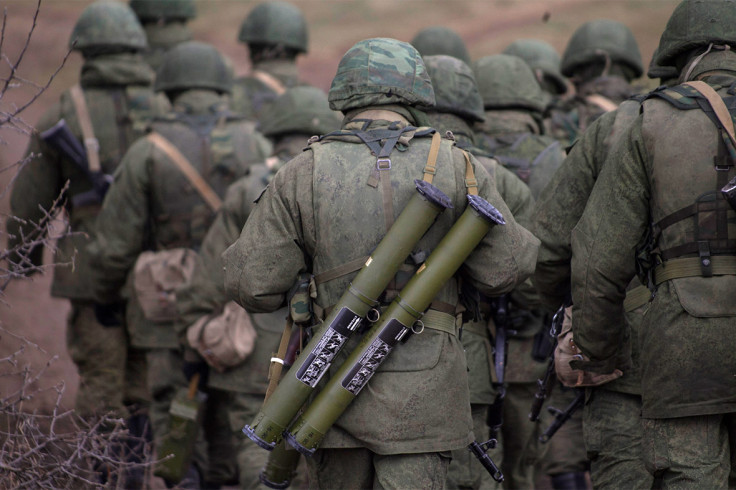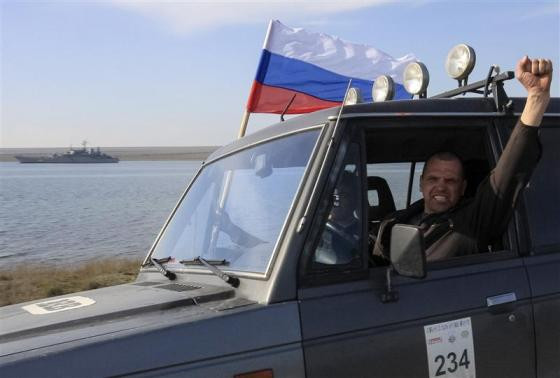Crimea Crisis: When is the Right Time for the West to Negotiate with Putin Over Ukraine?

Diplomats exist in order to negotiate. Churchill saw that 'to jaw jaw is always better than to war war' is in their DNA. But negotiation only succeeds when the time and the circumstances are right. At the end of the 2008 Georgian conflict President Nicolas Sarkozy rushed into frenetic negotiations, the results of which effectively sanctioned Russia's continuing occupation of parts of Georgia.
This error should not be repeated following recent events in Crimea. Now would be the wrong time to negotiate with Russia over Ukraine – especially if it meant, as it probably would, negotiating over the heads of the Ukrainians. The yeast needs to be given time to work.
In the corridors of Brussels, some are arguing that the EU should send emissaries to Moscow to head off the risk of further escalation. The risk undoubtedly exists. President Vladimir Putin is playing a dangerous game of brinkmanship.
But consider Putin's position. He is basking in the adulation of his people. He has stood up to the West and righted what many Russians saw as an historic wrong – the loss of their 'inalienable' Crimea. He has diverted attention away from the sliding economy and his mismanagement of Russia. People are on the streets celebrating under the Russian flag, not under placards complaining about corruption and dismal public services.
Putin has Ukraine under pressure and under threat. He has troops on the border, and has given himself the authority to deploy them on Ukrainian territory. Agitators encouraged or sent by Russia are disrupting eastern Ukrainian cities, such as Kharkiv and Donetsk. Russia is squeezing the Ukrainian economy, raising gas prices and demanding repayment of loans. The fragile interim government in Kyiv is struggling to cope.
Putin has declared that he does not intend to invade eastern Ukraine (now minus Crimea). He is running the risk that incidents provoked by uncontrolled extremists from one side or the other could put him under pressure to 'protect' Russian-speaking Ukrainians; but creating a pretext for invasion does not look like an attractive option for him. Some of the Ukrainian forces that have been digging in along the border would probably fire back.
A fratricidal war, however short, with Slavic brethren in Ukraine would play much less well on the streets of Nizhny Novgorod or Novosibirsk than the bloodless coup in Crimea. Few Ukrainians would welcome Russian troops as liberators. Those who have always sought good relations with Russia, former Presidents Leonid Kuchma and Leonid Kravchuk among them, are resolutely attached to Ukraine's sovereignty: they do not wish to be ruled again from Moscow. And, having occupied regions of Ukraine, what would Putin do next? It would be a huge burden on a Russian state which is not short of other ones.
While a Russian invasion of eastern Ukraine can by no means be excluded, Putin must surely calculate that it would be a poor and risky option. He also knows that it would trigger much deeper Western sanctions, which would hit his Achilles heel – Russia's declining, unreformed economy. In the back of his mind will be memories of the Politburo's ousting of Nikita Khrushchev after the humiliating failure of his high-risk adventurism over Cuba. Far better for Putin to sustain the leverage of the threat than to risk using it.
Would the appearance of EU envoys in the Kremlin, pleading with Putin to get off the backs of the Ukrainians, make any difference to his calculation? If, notwithstanding the downside, Putin is bent on further escalation, European pleas would not stop him. The envoys would risk receiving an ultimatum instead.
The US and the EU were right to try to negotiate with Putin before the annexation of Crimea. Had he been willing to negotiate, there could have been an acceptable and peaceful outcome. He was not willing. He unleashed a propaganda onslaught on his domestic audience, so effectively that even people in Moscow who should have known better were talking to me last week about 'pogroms' in Ukraine and a 'failed state run by fascists'.
Putin raised expectations and revanchist euphoria to the point where he had boxed himself in. Anything other than the annexation of Crimea would have looked like a defeat. Significantly, he has been careful not to raise expectations of further escalation (although Deputy Prime Minister Dmitry Rogozin, among others, has started to talk about changing the status of the breakaway Transnistrian 'republic' in Moldova).

It would have been better still if an effective forum had been created to manage the tensions and risks of instability that lie along the fault-lines left by the implosion of the former Soviet Union, perhaps through a higher-level version of the OSCE. The Ukrainian crisis, following the conflict in Georgia six years ago, will not be the last of the aftershocks of 1991 to affect Europe. The EU could have been negotiating months and years ago on how to prevent Ukraine becoming an arm-wrestle between Russia and the West. When the crisis subsides, it should think more seriously about how to pre-empt the next one; but that is not for now.
If, notwithstanding the downside, Putin is bent on further escalation, European pleas would not stop him.
Putin would receive any EU negotiating mission by telling it first that Crimea was off the agenda, and that he had all of Russia behind him. The European envoys would harrumph a little about non-recognition and fall silent. With rising emotion, the president would reprise his speech in the Kremlin on 18 March, itemising Russia's rights and grievances – some real, some imagined, all exaggerated. With bluff and bravado, he would laugh off Western sanctions. On Ukraine, he would maintain a menacing tone, disparaging the interim government and chilling European spines with warnings of his duty to protect vulnerable ethnic Russians.
Then Putin would list his demands. These have already been indicated by the Russian government. First, that Russia will not recognise or negotiate with the interim government that resulted from the ousting of Viktor Yanukovych. The EU should return to the agreement of 21 February signed between Yanukovych and the opposition and underwritten by the EU, or to some modified version thereof (minus the ousted president) to provide for an administration more acceptable to Russia. Second, that Ukraine should be declared neutral.
The possibility of joining Nato or the EU should be excluded. Relations with the EU should not be developed in a way that excluded Russia. Third, that (in the Ministry of Foreign Affairs' words) 'the Ukrainian parliament must without delay convene a constitutional assembly', i.e. that Ukraine's constitution should be rewritten to create a federal state allowing wide autonomy to its regions. Finally, Putin would wish the EU well in the near-impossible task of trying to stabilise Ukraine.
So what could EU envoys achieve when faced with this? Should they shuttle between Kyiv and Moscow to help impose the Kremlin's diktat on Ukraine – or go home with their tails between their legs?
And, if now is not the time to negotiate with Russia, what then?
The EU and the United States have committed themselves to supporting Ukraine's sovereignty. That must be the centre of their policy.
In the short term, this means helping the interim government to stand up to Russian intimidation, to exercise stronger control (including over Ukraine's own ultra-nationalists) and to steer the country to and through the 25 May presidential election. It also means propping up Ukraine's finances. It requires a measured but firm stance towards the Kremlin, not a display of weakness or disunity.
Over a longer term, the West needs to help Ukraine in the daunting task of building a broad political consensus and a more robust state; of in all likelihood revising the constitution; of reducing the power of the oligarchs; of developing the rule of law; and of creating a functioning economy. All this in a country of 45 million people: Ukraine is no Kosovo. Writing cheques is not enough. If Ukraine is to succeed, it will demand a major Western commitment of human as well as financial resources over a decade, perhaps through some form of task force under senior leadership. If the West is not prepared to make that commitment, it should not have got so deeply involved in Ukraine in the first place.
The time to talk to Moscow will come, but only when the immediate threat has been faced down and a new Ukrainian government is in place – a government recognized by Russia and taking its own decisions. Ukraine should be in the lead, with the EU and US in support, not the other way around. By then the Kremlin will have had time to make a more sober assessment of the consequences of its recent behaviour.
Russia's connections with Ukraine – trade, investment, the web of personal, family, cultural and historical links – do not legitimise the Kremlin's wish to limit Ukraine's sovereignty, but should certainly be taken into account. Ukraine's future stability and prosperity require a harmonious relationship with Russia, with borders open to people and trade, as well as with its EU neighbours. For either side to approach this as a zero-sum question is a recipe for endless trouble.
For as long as the current situation persists, Ukraine loses, Russia loses (within Ukraine and in its relations with the West) and the West loses. Lose, lose, lose could eventually become win, win, win – but it will take time, rationality and a great deal of effort. There is no magic wand.
The Rt Hon Sir Roderic Lyne is Deputy Chairman of Chatham House and an adviser on its Russia and Eurasia Programme. You can read more about him here.
This article was originally published by Chatham House, a renowned source of independent analysis, informed debate and influential ideas on how to build a prosperous and secure world for all. Go to www.chathamhouse.org to find out more.
© Copyright IBTimes 2025. All rights reserved.





















